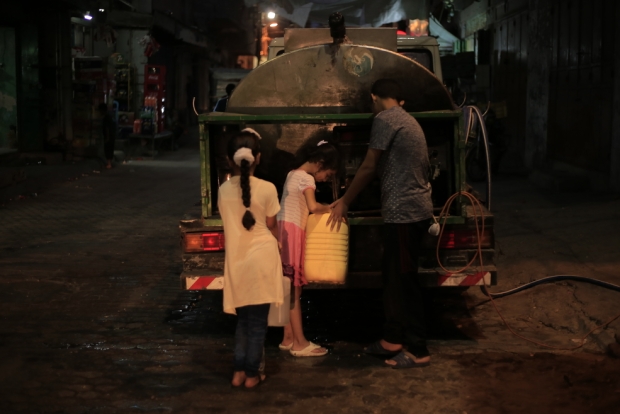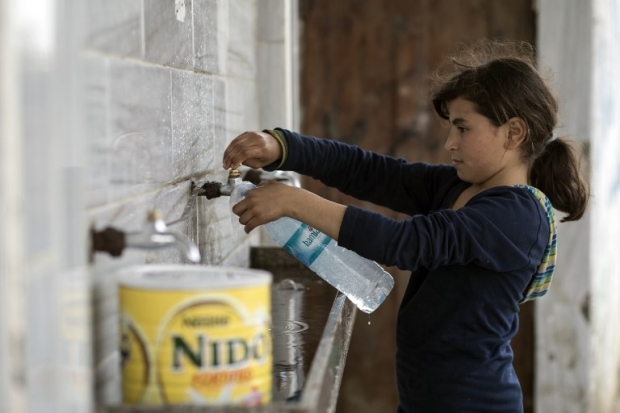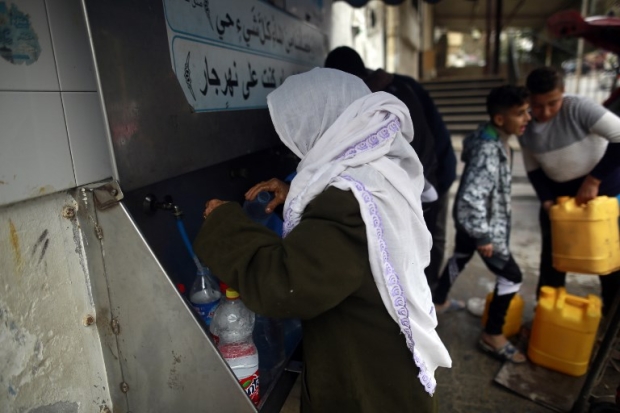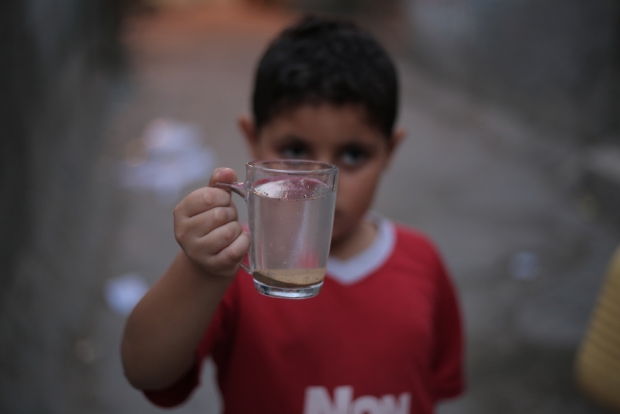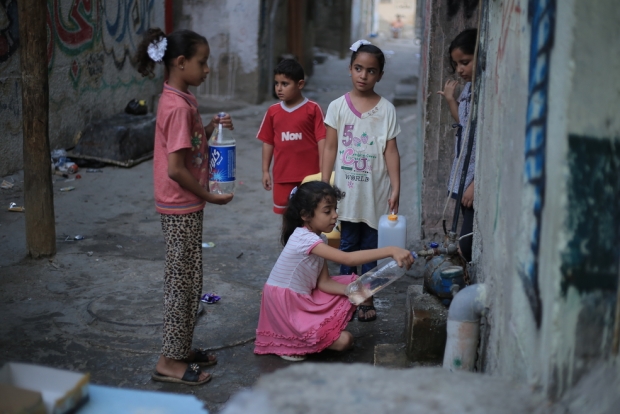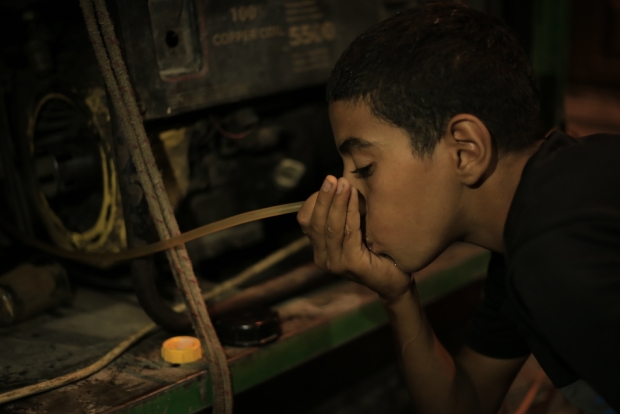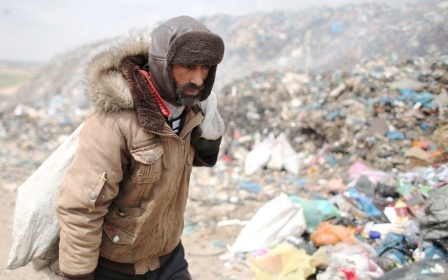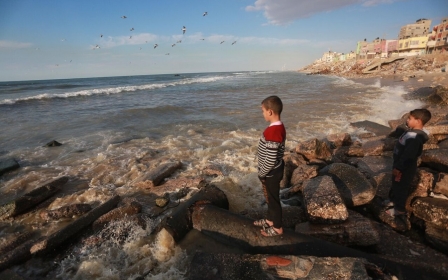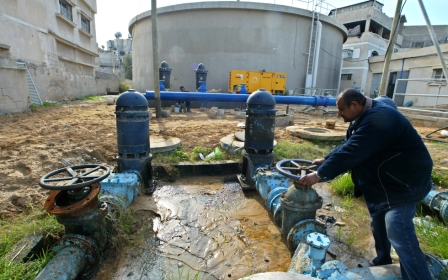Leaky cesspits, raw sewage and salty water: Gaza's forgotten water crisis
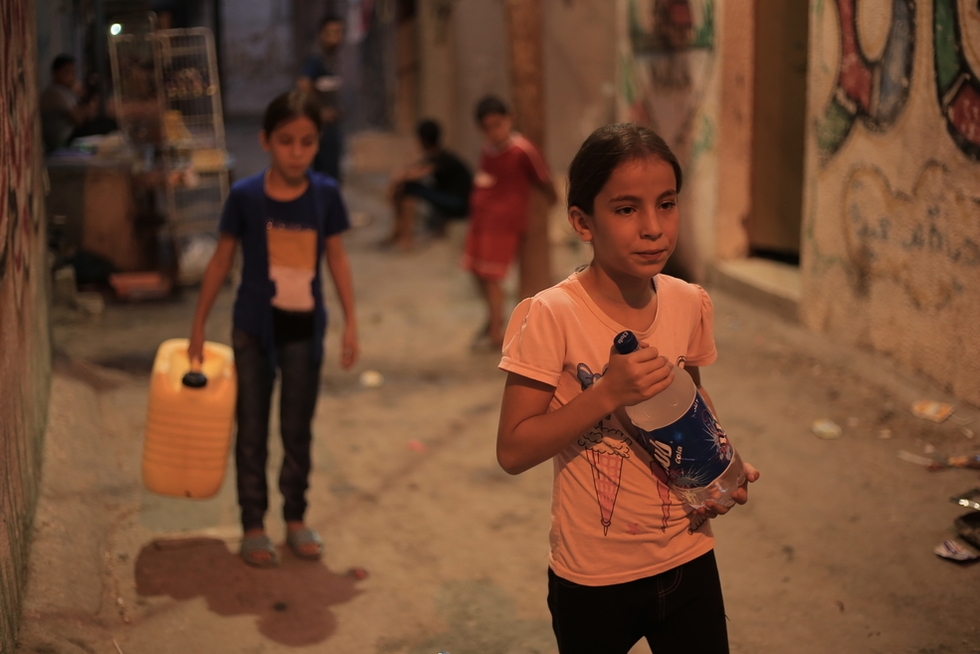
Al-SHATI REFUGEE CAMP, Gaza - Every three days, the al-Natour family has two hours to stock up on water.
Mohammed, 54, his wife, Khitam, who is in her 40s, and their four daughters and two sons use this precious window to fill containers for all of their drinking and cleaning needs. They need to do this quickly before the tap runs dry again in their home in the al-Shati refugee camp in the north of Gaza. Their situation in Gaza is not uncommon.
Like the Natours, thousands of families face severe shortages of clean water and go through the same motions in Gaza every week.
The World Health Organisation (WHO) estimates that individuals in Gaza should have access to at least 100 litres of water per day. But experts say Palestinians in Gaza have an average of 60 to 70 litres each day, with many having access to just 20 to 30 litres.
The little water that residents of the Gaza Strip can access is untreated and unhealthy. Causes of the shortage are complicated, with devastating consequences that some argue amount to a violation of human rights.
To make matters worse, each year Gaza's besieged population grows by 3.8 per cent, or as many as 70,000 people, according to Ahmad Helles, director of the environmental awareness department of Gaza's Environment Quality Authority, one of the two experts interviewed by Middle East Eye.
Destroyed by war, stifled by siege
The Gaza Strip needs 200 to 220 million cubic metres of water a year to provide for its two million residents, but the enclave has a deficit or more than 140 million cubic metres, the experts said.
"I remember not too long ago when everyone in Gaza could drink water from the tap in the home," said Ibrahim Othman, a 70-year-old who lives in Al-Sheikh Radwan neighbourhood.
That was the late 1990s. Since then, with the salt water flowing into the depleted aquifer making the drinking water so salty, it is no longer drinkable, according to Othman.
There are five wastewater treatment plants in Gaza, the largest and first treatment plant of which was built in 1995, and over 250 desalination plants, the majority of which are publicly run.
However, the severe electricity and fuel shortages which have marked life in Gaza since the beginning of the Israeli-led blockade in 2007 have left these plants with only four to five hours of electricity each day.
"The water crisis existed before the siege but has been exacerbated very much after it, especially because of the electricity crisis," Othman said.
The high volume of wastewater produced by Gaza's nearly two million inhabitants in one of the world's most densely populated territories is too much for the strained infrastructure, leading to many floods, especially during the winter.
The continuous interruption of electricity reportedly leads to the discharge of up to 125 million litres of poorly treated sewage into the sea every day, the experts said.
Successive Israeli wars on Gaza in 2009, 2012 and 2014 have further compounded the collapse of the enclave's infrastructure.During the 2014 war, Israeli forces bombed water treatment stations, including pumps and purification infrastructure, directly affecting water access to more than 700,000 homes and disrupting around 70 per cent of water installations in Gaza, according to the Palestinian National Information Centre.
Recovery has been hard. Some 23 essential water, sanitation and hygiene items – like disinfectant chemicals, pumps and drilling equipment – are on a list of 3,500 goods that are prevented from entering Gaza because Israel has classified them as "dual-use". Dual-use refers to items Israel claims can be used for both civilian and military applications.
Leaky cesspits and raw sewage
With Gaza's infrastructure already on the brink, population growth has further stretched thin the area's limited resources.
"So, they are relying on leaky cesspits used for the temporary collection and storage of sewage or waste, which need to be emptied frequently," Helles, the director in Gaza's Environment Quality Authority, said.
"The [water] treatment effect of using a cesspit is very low, but emptying it can result in high operation and maintenance costs that most can't afford due to bad economic conditions."
In some areas, water contains four times more nitrate and 48 times more chloride than is considered safe
- Munther Shublaq, General Director of the Coastal Municipalities Water Utility (CMWU)
As a result, he said, the cesspits overflow, discharging around 2,000 tons of solid waste every day and producing up to 500,000 litres of toxic sludge, which eventually seeps into the groundwater.
In addition to polluting water, there is also a constant lingering smell of potent sewage in these neighbourhoods.
"A powerful smell hit me as I entered Gaza a fortnight ago," wrote Tim Holmes, an Oxfam programme manager who visited the enclave in May.
"Not the smell of burning tyres from the ongoing protests, or the tear gas that has been used in response, but the smell of raw sewage."
Necessities become luxuries
The unsustainable circumstances have taken their toll.
While on average residents of the Gaza Strip use between 60 and 70 litres of water per day, the electricity crisis means that in effect households are only able to receive water every three days, or in some cases only once a week.
The little water residents of Gaza do receive, however, is undrinkable.
In some areas, water contains four times more nitrate and 48 times more chloride than is considered safe, he said.
As a result, Gaza residents often find themselves with no choice but to buy expensive bottled water.
In the Natour family, Khitam said her kidney issues necessitate that she drink bottled water, but at $1.50 a day in an area where, according to the World Bank, the average yearly income is $1,826, a necessity becomes a luxury.
"I bought it once and then couldn't afford the expense," she said.
The Natours buy $11 worth of drinking water each month and take advantage of the two hours of water they get every few days, stocking up to the best of their ability and sometimes washing their clothes at their neighbour's home, although that option is not always available.
"My neighbour has not had water for 14 days, so he has to walk a long distance to reach a place that fills the water for free," Mohammed Natour said.
"Our enemy is winter," Khitam Natour said. "What we fear most now is winter, since our simple house is built of asbestos that has cracked during wars.
"This forces us to stay all winter in just one room and all sleep on one bed."
The situation poses severe health and environmental hazards, particularly during the summer, when swimming in the Mediterranean Sea is one of the few recreational activities available to the population of Gaza.
According to the WHO, water-related diseases account for 25 per cent of illnesses in Gaza.
Helles said that the high level of nitrates in water has led to an increase of cyanosis, a condition in which the skin turns blue from lack of oxygen, in children.
The Water Sanitation and Hygiene Cluster, a partnership of more than 30 groups and other international organisations working in the water sanitation and hygiene sector, has expressed concerns over the risk of an epidemic of cholera or another infectious disease should the electricity crisis continue and Israeli authorities persist in blocking necessary equipment and material from entering Gaza easily.
Water as a human right
The catastrophic situation of water resources in Gaza has led some Palestinians to accuse Israel of violating internationally acknowledged human rights.
In 2010, the UN Human Rights Council officially recognised the right to drinking water and sanitation as legally binding within existing human rights treaties.
Article 24 of the Convention on the Right of the Child, ratified by Israel in 1991, declares that signatories "must combat disease and malnutrition" through providing "adequate nutritious foods and clean drinking-water, taking into consideration the dangers and risks of environmental pollution".
The UN Office of the High Commissioner for Human Rights has also affirmed that the right to safe drinking water and sanitation "is derived from the right to an adequate standard of living and inextricably related to the right to the highest attainable standard of physical and mental health, as well as the right to life and human dignity".
In the al-Shati refugee camp, these declarations seem to have had little impact on the daily lives of the Natours.
"I won't say if there is water in general, life will be better," said Mohammed Al-Natour. "We must instead say, only if there is a clean, pure and drinkable water, we will find a part of our lost life."
New MEE newsletter: Jerusalem Dispatch
Sign up to get the latest insights and analysis on Israel-Palestine, alongside Turkey Unpacked and other MEE newsletters
Middle East Eye delivers independent and unrivalled coverage and analysis of the Middle East, North Africa and beyond. To learn more about republishing this content and the associated fees, please fill out this form. More about MEE can be found here.


